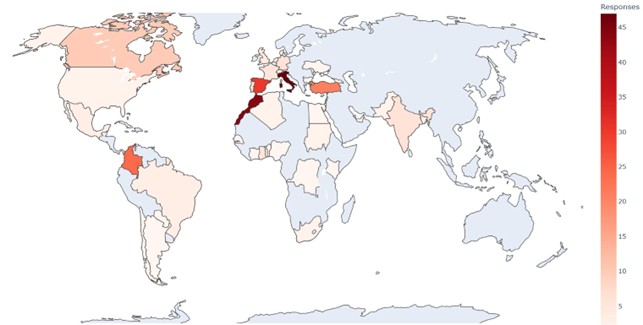Session Information
Session Type: Poster Session A
Session Time: 10:30AM-12:30PM
Background/Purpose: Artificial intelligence (AI) is transforming rheumatology care, with innovative tools now empowering physicians and health professionals (HPRs). Our survey examines how adult and pediatric rheumatologists, and HPRs currently perceive and utilize AI tools in rheumatology clinical and research environments, by identifying their experiences, concerns, and unmet needs.
Methods: An international, cross-continental online survey following CROSS & CHERRIES frameworks was shared in March 2025 to gather perspectives from the adult and paediatric rheumatology community. The questionnaire included 27 questions, both multiple-choice and open-ended, in four sections: sample characteristics, AI usage and applications, opinions and concerns, and expectations for AI implementation in clinical practice and research.
Results: By early May 2025, a total of 263 respondents (63.5% female) from 43 countries completed the survey, including rheumatologists, paediatric rheumatologists, and HPRs (figure 1). Median age of responders was 38 [IQR 32–48.5] years; only a minority of participants primarily worked in paediatric rheumatology (52, 19.8%), as HPRs (24, 9.1%), or mainly in research rather than clinical practice (54, 20.5%).Most respondents (220, 83.7%) reported using large language models (LLMs) for medical purposes, commonly for text editing (176, 66.9%), brainstorming (137, 52.1%), summarizing papers (133, 50.6%), and manuscript writing assistance (115, 43.7%); only 30 (11.4%) respondents had never used LLMs. Attitudes towards AI were predominantly positive, with 204 (81.4%) expressing optimism regarding AI’s efficacy and safety. However, up to 151 (58.1%) participants emphasized the need for strict AI regulation in medicine.AI literacy was highly valued, with 214 (81.6%) rating it as very or extremely important, with 92 (35.5%) having or having had subscriptions to AI models/tools. Respondents favoured LLM use for practical tasks: email drafting (191, 72.9%), copy-editing (191, 74%), generating manuscript sections (136, 51.9%), and facilitating reference access (157, 59.9%). Substantial support existed for integrating AI into peer review, assisting reviewers (118, 45%) and editors (112, 42.7%). Respondents indicated AI’s greatest future impact in research (212, 80.6%), diagnosis (183, 69.6%), and administrative tasks (177, 67.3%).Key concerns included ethical issues (176, 67.2%), lack of trust in AI-generated decisions (181, 69.1%), and insufficient training (156, 59.5%). Respondents supported AI integration into rheumatology practice, with only 5 (1.9%) not recommending AI tools to colleagues.
Conclusion: Pilot results suggest the rheumatology community is recognizing AI’s transformative potential whilst acknowledging the need for appropriate governance frameworks. AI tools are widely used and positively perceived by rheumatology and pediatric rheumatology professionals. However, concerns about ethics, trust, and training highlight the need for clear guidance and targeted education to support safe integration into clinical and research practice.
 Figure 1 . Geographic distribution of survey respondents
Figure 1 . Geographic distribution of survey respondents
To cite this abstract in AMA style:
Rebollo-Gimenez A, La bella S, Aouad K, Gupta L, Cangelosi D, Högle T, Knitza J, Ruperto N, Venerito V, El Maghraoui A, Alongi A, bautista molano W, Bayraktar D, Davergne T, Dey D, Hmamouchi I, Hoens A, Li L, Migowa A, Treemarcki E, Ziade N, Kragstrup T, Benavent D. Artificial intelligence in adult and paediatric rheumatology practice and research: pilot results from an international survey [abstract]. Arthritis Rheumatol. 2025; 77 (suppl 9). https://acrabstracts.org/abstract/artificial-intelligence-in-adult-and-paediatric-rheumatology-practice-and-research-pilot-results-from-an-international-survey/. Accessed .« Back to ACR Convergence 2025
ACR Meeting Abstracts - https://acrabstracts.org/abstract/artificial-intelligence-in-adult-and-paediatric-rheumatology-practice-and-research-pilot-results-from-an-international-survey/
